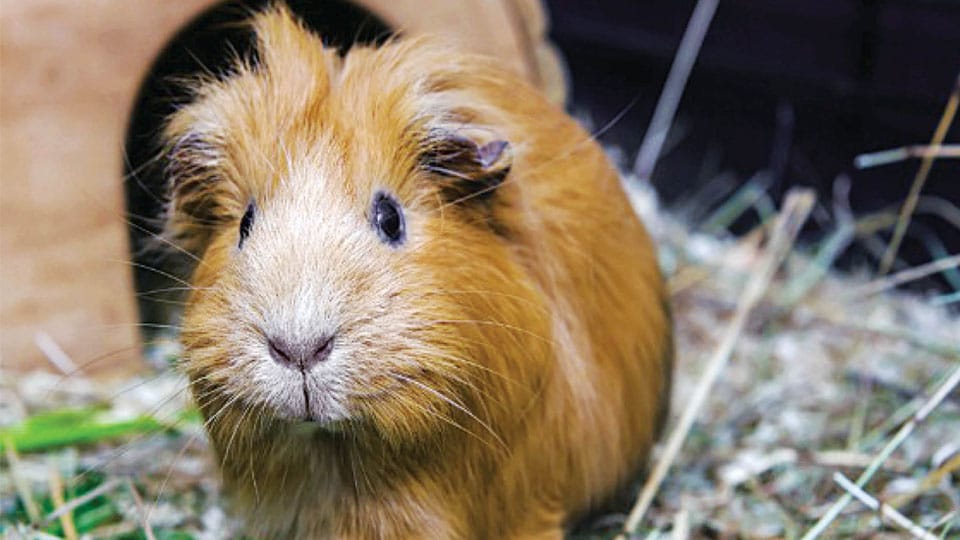In this week’s Pet Talk, Maneka talks about guinea pig, its behavioural changes and ideal temperature for it to be healthy
By Maneka Gandhi
My guinea pig has become slow and listless these days. Is something wrong?
Generally, if you notice a change in behaviour in your Guinea pig, it is wise to check for other symptoms as well. Immediately check if your Guinea pig has laboured breathing, bloated abdomen, is he/ she eating and drinking normally, are there any changes in the faeces or urine passed? If you notice any of these symptoms it is best to consult a vet, as a disease, or any condition, can make your pet go downhill very quickly. Generally, if you notice lethargy in your Guinea pig, it can be a sign of a URI (Upper Respiratory Infection) or allergies. URI is a more serious condition and will require immediate action from your Vet. Guinea pigs are prone to pneumonia, because they do not do well in cold environment. So, ensure that your Guinea pig is warm and there are no drafts, and stay away from your pet Guinea if you have a cold.
My guinea pig is chewing on the plastic bars of the cage. How do I make it stop?
There could be several reasons why your Guinea pig is chewing on the cage. One of the more concerning reasons is that it is having some dental problem, like an overgrown teeth, which can be easily diagnosed and fixed by a vet. Other reasons are that it is bored or nervous, or just wants your attention. To stop it from chewing on plastic, you could observe your Guinea’s chewing habits for a couple of days. Notice if there is a particular time or incident when it starts chewing on the plastic. Has there been a change in the environment? Does it happen if there is a commotion or loud noise nearby? Or does it start chewing when left alone for some time? If this is the case then the chewing can be psychological. You can introduce some non-toxic chew sticks or nibble toys for your Guinea pig to chew on. If your Guinea is feeling lonely or needs more attention, try to spend more time playing with it. If your Guinea pig is bored then try changing things up in its cage by putting in new toys or some new hay or putting in a new hideout. Or let it out during the day and only put it in at night. Guinea pigs are not meant to be caged animals.
My guinea pig seems to be shivering. Is something wrong?
Generally, Guinea pigs shiver because of fear. If there are any animals in the vicinity of your Guinea pig, or if it is in a new environment then, it could be experiencing fear. Try to placate you Guinea pig by making it comfortable, spending time with it and ensuring that no animals in the vicinity are scaring your pig.
Another cause of shivering is if your pet is cold. Guinea pigs can’t handle cold well. Even if it feels warm to you, it might not be warm enough for your Guinea pig. Ensure that there is no wind or drafts near your Guinea pig’s cage and that it is sufficiently warm and cosy. Guinea pigs are prone to pneumonia and respiratory infections, so if you notice any abnormal amount of shivering with other symptoms, immediately get your Guinea pig checked out.
Do I need to bathe my guinea pig?
No. Guinea pigs are quite capable of cleaning themselves and taking care of their hygiene. In fact, taking a bath could be stressful. They are not natural swimmers and they are prone to cold, so taking a bath could lead to some serious diseases. Your Guinea pig has natural body oils which get stripped when they take a bath, leaving them susceptible to parasites infestation. You should not give your Guinea pigs a bath, unless they are very dirty and need to be cleaned up, if your Guinea pig recently had a parasite infestation and you need to clean out the dead parasites, if it has a dirty rump because of bladder infection or diarrhoea. If you must give your Guinea pig a bath, make sure of the following details:
• The water is not too cold.
• The room, in which you are giving your Guinea pig a bath, is not too cold.
• Do not use a deep washing bowl, and ensure the water is not deeper than the animal.
• After the bath, immediately dry your Guinea pig with a towel, or flannels, by gently rubbing or patting down in the direction of the fur.
My guinea pig is eating its droppings. Is this normal?
Yes, it is very normal and, in fact, it is healthy for your Guinea pig. Guinea pigs have two types of food droppings — dark solid droppings and soft squishy droppings called caecals or cecotropes. Caecals are lighter in colour with a green or yellowish tint to them. Plant material is difficult to digest in one go, therefore many of the nutrients don’t get absorbed in the intestine, and pass out of the body as faecal matter.
Like a cow chews the cud, a Guinea pig eating its caecals is a similar process. The food is first consumed and broken down by bacteria in the intestines of the Guinea pig. This results in partial absorption of the nutrients in the food. The Guinea pig will then consume the caecal again to thoroughly absorb the nutrients. Therefore, ensure that your Guinea pig gets an adequate balanced diet to keep it healthy.
My guinea pigs always have a strong smell coming from them, even if I clean up the cage regularly. Is this normal?
Typically, Guinea pigs keep themselves very clean. Sometimes a musky smell can come from your Guinea pig (especially a male) due to natural hormone fluctuations, or during the period a baby guinea pig is growing up into an adult. The other reason could be that the faecal matter, or urine, is getting stuck on your Guinea pig’s bottom fur which could lead to foul odour. To clean its bottom, you can take a cotton ball dabbed with a little coconut oil and gently clean the bottom of your Guinea pig.
Are guinea pigs suited to the hot temperatures, such as in India?
The ideal temperature range for a Guinea pig is between 18-25 degrees Celsius. Anything above or below this range can lead to your pet Guinea pig becoming stressed. In hot weathers, such as in many parts of India, Guinea pigs can suffer from heat stress, lethargy, heat exhaustion, heatstroke and dehydration. Even though your Guinea pig might not display very obvious signs of being affected by the heat, hot climate can take a considerable toll on your pet’s health. So, before adopting a Guinea pig, please ensure that the climate where you live is suitable for your pet as well.
My pet guinea pig has a swollen foot and is unable to walk properly. It is also losing hair on the same foot.
One of the main reasons is having wire mesh for it to walk on in its cage. Pododermatitis is a condition in which a guinea pig’s footpad becomes inflamed, develops sores, or becomes overgrown. The appearance may be similar to calluses, or small tumours on the bottom of the foot. This condition is commonly referred to as bumblefoot. When bumblefoot is left untreated, or is present in a very severe form, there are sometimes complications in treatment and the infected leg may have to be amputated.
The infected guinea pig’s footpads may become inflamed (redness), develop sores, or become overgrown over the course of many months. Other signs and symptoms include: Loss of hair on affected foot; Reluctance to move or inability to walk normally; Loss of appetite due to pain; Joint or tendon swelling.
Pododermatitis can be difficult to cure. Start with switching your pet’s living quarters to ones with a smooth bottom, improving sanitation and changing the bedding to softer material. Your veterinarian is likely to clean any wounds, clip the hair around the affected areas, and trim any overgrown nails. Affected feet should be soaked in an antibiotic solution, and antibiotic ointment should be applied. In severe cases, animals may need antibiotics and pain medications.








Recent Comments